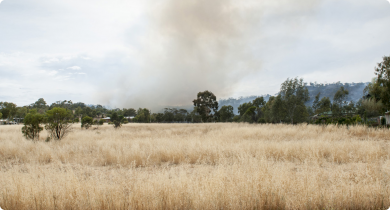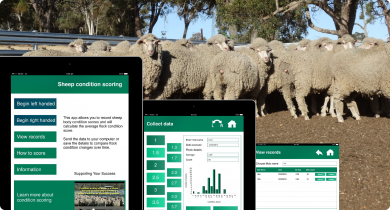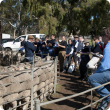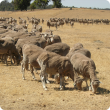Livestock management
Management of livestock must take into account variable seasonal factors, fluctuating markets and declining terms of trade. The most successful producers have a good knowledge of market requirements, matching product quality to suit. There are many factors that can determine the productivity and profitability of a livestock enterprise. These include the supply and quality of feedstuffs, the use of the most appropriate genetics, ensuring high health standards, optimising housing or environmental conditions, meeting quality assurance requirements, and having a sound knowledge of market requirements. This requires good communication along the value chain.
The Department of Primary Industries and Regional Development has technical expertise in a range of areas related to livestock management but acknowledges that there are many other sources of information that producers should be encouraged to seek out. There are many grower groups who play an important role in encouraging discussion amongst producers to improve adoption of new technology, as do private consultants and university scientists.
See Also
Filter by search
Filter by topic
- (-) Remove Management & reproduction filter Management & reproduction
- Livestock species (59) Apply Livestock species filter
- Sheep (44) Apply Sheep filter
- Pests, weeds & diseases (19) Apply Pests, weeds & diseases filter
- Biosecurity & quarantine (19) Apply Biosecurity & quarantine filter
- Biosecurity (19) Apply Biosecurity filter
- Livestock health & diseases (18) Apply Livestock health & diseases filter
- Diseases (18) Apply Diseases filter
- Livestock biosecurity (17) Apply Livestock biosecurity filter
- Livestock disease surveillance (12) Apply Livestock disease surveillance filter
- Beef cattle (11) Apply Beef cattle filter
- Feeding & nutrition (7) Apply Feeding & nutrition filter
- Pigs (5) Apply Pigs filter
- Livestock parasites (5) Apply Livestock parasites filter
- Genetics & selection (4) Apply Genetics & selection filter
- Climate, land & water (4) Apply Climate, land & water filter
- Dairy cattle (3) Apply Dairy cattle filter
- Land use (2) Apply Land use filter
- State Barrier Fence (2) Apply State Barrier Fence filter
- Poultry & birds (2) Apply Poultry & birds filter
- Invasive species (2) Apply Invasive species filter
- Control methods (2) Apply Control methods filter
- Mechanical, physical and cultural (1) Apply Mechanical, physical and cultural filter
- Pasture management (1) Apply Pasture management filter
- Meat quality (1) Apply Meat quality filter
- Pastures (1) Apply Pastures filter
- Stockfeed (1) Apply Stockfeed filter
- Wildlife biosecurity (1) Apply Wildlife biosecurity filter
- Water (1) Apply Water filter
- Veterinary chemicals (1) Apply Veterinary chemicals filter
- Livestock research & development (1) Apply Livestock research & development filter
- Rangelands (1) Apply Rangelands filter
- Land use planning (1) Apply Land use planning filter
- Climate & weather (1) Apply Climate & weather filter
- Chemicals (1) Apply Chemicals filter
- Animal welfare (1) Apply Animal welfare filter
- Climate change (1) Apply Climate change filter
- Crops (1) Apply Crops filter
- Goats (1) Apply Goats filter
- Food, export & investment (1) Apply Food, export & investment filter
- Emergency animal disease preparedness (1) Apply Emergency animal disease preparedness filter
- Livestock movement & identification (1) Apply Livestock movement & identification filter








